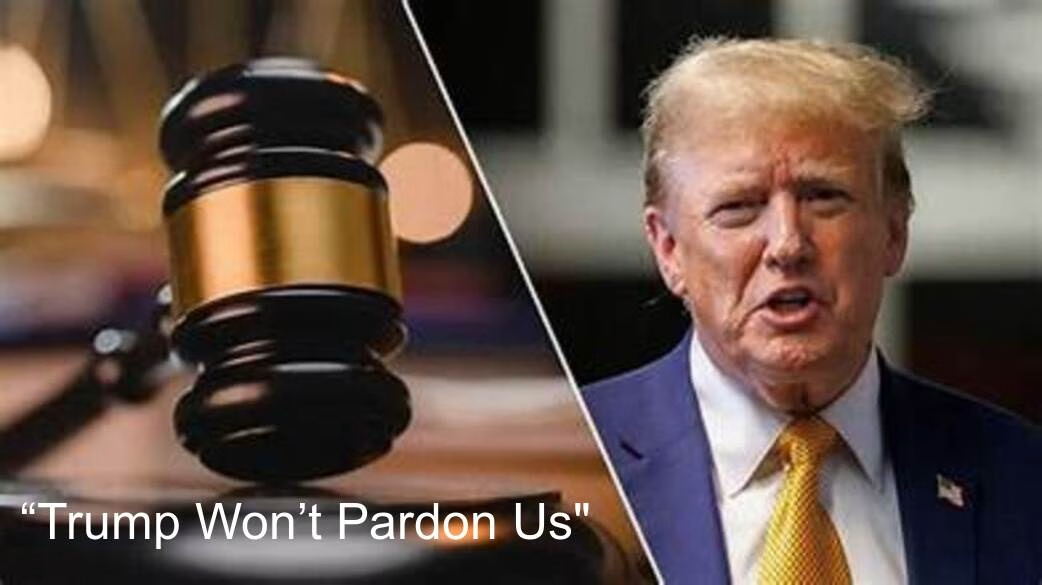By Don Terry | Friday, October 24, 2025 | 5 min read
Across courtrooms and campaign stops, a new refrain has begun circulating among Democratic strategists and defense lawyers: “Trump won’t pardon us.” It is part irony, part political realism—a reminder that, unlike some on the right who once counted on presidential clemency, Democrats expect no safety net. The phrase has become shorthand for accountability, signaling that liberal defendants must answer fully for their actions. In an era when law and politics have grown uncomfortably entangled, it stands as both a legal argument and a statement of principle.
For many Democrats and Independents, the remark is a pointed contrast to the years when pardons appeared to serve political ends. During Donald Trump’s presidency, the clemency process often bypassed the Justice Department’s review system, instead favoring public figures, campaign donors, and ideological allies. High-profile recipients included political operatives and former advisers convicted of lying to Congress or obstructing investigations. Legal scholars warned that the pardon power—once considered a constitutional tool for mercy—was being recast as a vehicle of political loyalty. Within that context, “Trump won’t pardon us” functions less as self-deprecation than as an assertion that accountability should not depend on partisan allegiance.
The sentiment also exposes the difficulty of separating justice from politics. Democrats and independents who invoke the line are not necessarily appealing for leniency; they are highlighting the uneven moral landscape left in the wake of the last administration. To them, clemency once meant compassion for the undeserving. In Trump’s America, it became a badge of loyalty. The resulting public cynicism has been profound, and the justice system—already strained by partisanship—has struggled to recover its sense of impartiality.
Trump’s use of pardons continues to spark debate. Supporters argue he exercised a constitutional right long used by presidents to correct judicial excesses. Critics counter that many choices defied ethical norms. Among the most controversial were pardons or commutations for individuals previously convicted of serious crimes, including one North Carolina man convicted of possessing child pornography and a January 6 rioter later facing child-sex-related charges.
Other pardons drew scrutiny for rewarding political allies and high-profile supporters, including former aides convicted of obstruction or lying to federal authorities. While legally permissible, these acts contributed to the perception that clemency had become a tool of political calculus rather than a measure of justice or mercy. Each instance intensified concerns that mercy had become tied less to law than to personal or political connection.
Will Trump Pardon Child Sex Trafficker Ghislaine Maxwell?
Even more sharply, Ghislaine Maxwell’s case has become a symbol of the tension between law and presidential clemency. Maxwell, convicted in 2021 on federal sex trafficking charges, was transferred between correctional facilities, which is standard for high-profile inmates. During this period, President Trump publicly mentioned that he might consider granting her a pardon. That statement, widely reported in the media, fueled debate about how political power intersects with criminal accountability. The public attention surrounding high-profile cases like Maxwell’s underscored concerns about unequal treatment before the law. Each statement regarding potential clemency sparked discussion over whether presidential pardons were being applied impartially or selectively to those with influence or notoriety.
The Democrats’ invocation of “Trump won’t pardon us” is therefore both practical and symbolic. It signals a recognition that legal outcomes cannot be assumed to favor one party or ideology. In courtrooms, the phrase may be deployed to emphasize good faith and transparency. On the campaign trail, it reinforces the notion that some actors, regardless of political stature, must face consequences. The line resonates because it embodies a longing for consistency—a justice system where consequences are applied equally, regardless of political affiliation or personal connections.
Even among those who use the phrase, there is awareness that moral certainty is rare. Democrats too have faced scandals and judicial scrutiny, but they stress that accountability should not depend on political patronage. The message is clear: no executive mercy is guaranteed, and adherence to law must remain paramount.
In the end, “Trump won’t pardon us” is less a boast than a caution. It reflects a nation grappling with double standards and the perception that justice can be negotiated or deferred based on influence. The phrase is about more than any single case; it is about public faith in institutions and the belief that fairness should remain a guiding principle. By drawing parallels to the sale of indulgences, critics emphasize that mercy, when granted selectively, risks undermining the credibility of justice itself. As the country continues to wrestle with these issues, the statement encapsulates a deep yearning for a legal system that applies the same rules to all, and a reminder that accountability is neither optional nor partisan.



